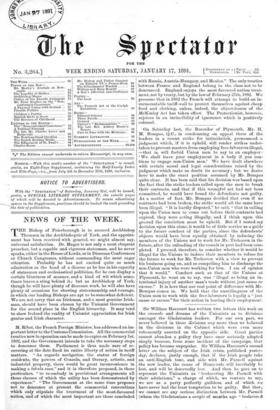M. Ribot, the French Foreign Minister, has addressed an im-
portant letter to the Customs Commission. All the commercial treaties now in operation can be made to expire on February 1st, 1892, and the Government intends to take the necessary steps to denounce them. Parliament is thus made sure of re- covering at the date fixed its entire liberty of action in tariff matters. "As regards navigation, the status of foreign residents, the powers of Consuls, and literary, artistic, and industrial property, there would be great inconvenience in making a tabula rasa," and it is therefore proposed, in these particulars, " to re-embody in provisional arrangements all those clauses of which the utility has been demonstrated by experience." " The Government at the same time proposes not to denounce at present the commercial conventions which only stipulate the treatment of the most-favoured nation, and of which the most important are those concluded
with Russia, Austria-Hungary, and Mexico." The only treaties between France and England belong to the class not to be denounced. England enjoys the most-favoured nation treat- ment, not by treaty, but by the law of February 27th, 1882. We presume that in 1892 the French will attempt to build an in- surmountable tariff-wall to protect themselves against cheap food and clothing, unless, indeed, the object-lesson of the McKinley Act has taken effect. The Protectionist., however, rejoices in an invincibility of ignorance which is positively colossal.






































